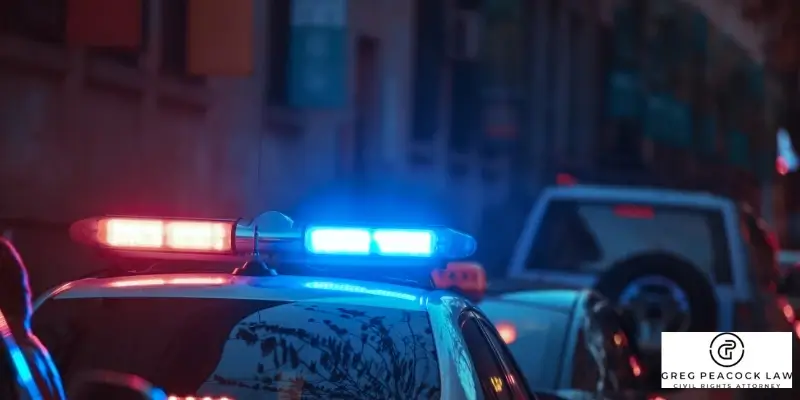Long Beach Police Brutality Lawyer

Long Beach Police Brutality Attorney
In fulfilling their duties, police officers are permitted to use force when necessary. However, when this force exceeds what is reasonable under the circumstances, it constitutes excessive force – commonly referred to as police brutality. This is a violation of a person’s Fourth Amendment rights. This allows the victim to seek justice. When this happens, a Long Beach police brutality attorney can help them seek compensation.
Police must be held accountable when inflicting violence to punish, intimidate or cause intentional harm to a suspect during a pursuit. Acts of police brutality include the use of police batons on the head or after a person was subdued, overuse or unwarranted use of taser guns, improper use of handcuffs, and illegal chokeholds.

What Is Police Brutality?
Police brutality describes situations where law enforcement officers exert excessive or unjustified force upon civilians. Officers can apply force to secure public safety but must adhere to established legal boundaries which define reasonable force. Police brutality occurs when officers exceed legal force limits by engaging in physical violence or wrongful arrests and weapon misuse, including tasers and batons.
Police brutality can be exhibited in a number of ways. Some examples of police brutality include:
- Using excessive physical force, such as beatings or chokeholds, disproportionate to the situation, especially if the civilian poses no threat.
- Unjustified shootings, particularly when there is no threat to the police officer’s life.
- Discriminating or racially profiling – racial minorities have been statistically proven to be disproportionately targeted by police.
- Prolonged restraint – restraining a victim unnecessarily and for prolonged periods of time can cause injury and even death.
The impact of police brutality extends beyond individual victims because it damages community trust while disproportionately targeting marginalized groups and leading to expensive legal settlements for cities. Victims who experience law enforcement officers abusing their power can legally seek justice through court action.
Pursuing Legal Action
People who experience police brutality maintain the right to pursue civil litigation to obtain justice. Civil claims may target both the offending officers and their employing municipalities under appropriate circumstances. Such claims require proof that the officer’s force application was excessive and resulted in direct harm to the victim. If evidence shows that improper training or supervision caused the incident, local municipalities could also face liability.
However, filing a claim against law enforcement agencies can be challenging. The legal principle of qualified immunity shields officers from being held liable unless the plaintiff proves that they breached established constitutional or statutory rights. Plaintiffs need to demonstrate through convincing evidence that the officer’s conduct was excessive and breached established legal rights during the incident.
Key Statistics in Long Beach Police Excessive Force
From 2016 through 2019, LBPD officers took part in incidents that led to 13 deaths and 56 severe injuries. The year 2019 saw 18 serious injuries and two deaths reported.
During this period, Long Beach showed a rate of serious use-of-force incidents that reached nearly three times the level of the Los Angeles Police Department and exceeded the San Francisco Police Department’s rate by more than five times when population adjustments were applied.
The LBPD used the most serious force 38% of the time against Black individuals, while Black people made up just 13% of Long Beach’s population in that four-year span. The data reflects a significant impact on Black communities. This aligns with state-wide trends, showing that Black individuals – who constitute 6.5% of California’s population – represent 18% of police-related serious injuries or fatalities.
Excessive force allegations have caused Long Beach to face major financial repercussions. A federal jury decided to give two cousins who were beaten by LBPD officers in 2010 a $1.6 million award in 2016. Ray Webb received a $620,000 verdict in 2017 after claiming that he experienced beatings and taser use during a 2011 traffic stop.
How a Long Beach Police Brutality Lawyer Can Help
A Long Beach police brutality attorney helps victims achieve justice while ensuring police forces are held responsible for misconduct. Victims face difficulty proving police misconduct because officers benefit from legal protections such as qualified immunity, which makes these cases complex. A seasoned legal professional collects vital evidence such as police reports, body camera footage, and witness testimonies to create a compelling case.
Lawyers have the capability to launch civil rights claims and negotiate settlements while they defend victims in court to obtain compensation for medical bills and lost income and to address emotional suffering and punitive damages. Legal action serves as a tool to drive policy changes and police reforms which help stop future abuses.
FAQs About Long Beach, CA, Police Brutality Laws
How Much Can You File a Claim for Police Brutality?
The damages you may recover through litigation depend on the injury level, emotional suffering, and other harm you endured. Settlements and verdicts can range in amount. Long Beach’s history shows excessive force cases receive substantial payouts, and wrongful death cases produce even bigger settlements. Compensation payments can include medical expenses, lost income, pain and suffering costs, as well as punitive damages.
How Do You Prove Police Brutality?
To prove police brutality, solid evidence must be presented through body camera footage, witness statements, medical records, and professional testimony. You need to prove that the officer applied excessive force, which surpassed what was required for the given situation.
The legal team examines the officer’s history of misconduct and policy breaches to build a stronger case against them. Complex legal claims demand professional legal representation to navigate successfully.
How Hard Is It to File a Claim Against a Cop?
It can be difficult to file a claim against a cop due to their “qualified immunity.” Qualified immunity gives police officers protection from liability unless they have clearly violated constitutional rights. The officer’s behavior must be established as both excessive and unlawful. Cities tend to fiercely defend against claims, while many legal cases reach settlement before reaching trial.
Can I File a Claim Against a Police Officer in California?
Yes, you can file a claim against a police officer in California. California residents have the legal right to file civil claims against police officers for excessive force, false arrest, wrongful death, and other civil rights violations according to both federal and state laws. Through these claims, victims pursue financial compensation for violations of their constitutional rights.
Contact Greg Peacock Law Today
If you have suffered excessive force at the hands of a police officer in Long Beach, an attorney at Greg Peacock Law can help you seek justice. Contact us today for more information.


